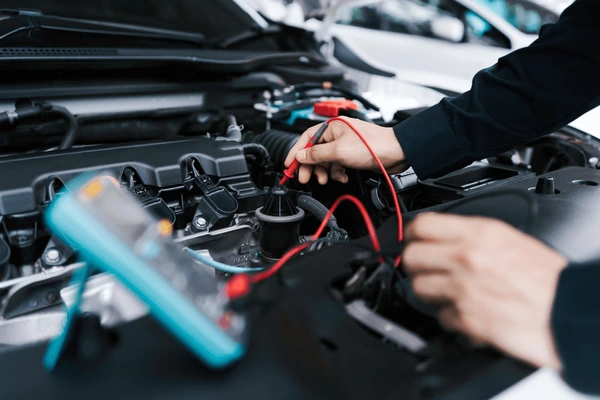
Your car’s electrical system is like its nervous system it controls, powers, and connects everything. From starting the engine to running the headlights and charging your phone, the electrical system keeps your vehicle alive. But just like our bodies, things can go wrong. Ever turned your key and heard nothing but silence? Or noticed your headlights dimming at night? These are classic signs that your car’s electrical system is crying for help.
In this guide, we’ll break down why electrical systems fail, how to spot the warning signs, and—most importantly how you can fix or prevent them.
●
Battery :
Provides the initial power to start the engine and runs electrical accessories when the engine is off.
●
Alternator :
Keeps the battery charged and powers electrical systems while the car is running.
●
Starter :
Cranks the engine when you turn the key or press the start button.
●
Fuses and Wiring : Protects circuits from overloads and carries electricity throughout the car.
Think of it as a team: the battery gives the first push, the starter cranks the engine, and once the car runs, the alternator takes over to keep everything alive. The wiring and fuses act as the veins and safety valves of the system. If one part fails, the whole system can stumble.
If your headlights or dashboard lights flicker, it usually points to a weak battery or alternator trouble
A clicking sound when turning the key often means the battery or starter is to blame.
Electrical shorts or overheating wires can cause dangerous sparks—don’t ignore this warning.
Radio not working? Power windows acting up? That’s often a fuse or wiring issue.
Batteries naturally wear out after 3–5 years. Extreme weather can speed up the process.
If your battery keeps dying even after replacing it, the alternator might not be charging properly.
When the starter wears out, the engine won’t turn over, leaving you stranded.
Fuses protect the car’s wiring. If one blows, a specific function (like the radio or headlights) stops working.
Rust and grime on battery terminals weaken the flow of electricity.
Old wires can fray, causing power loss or even sparks.
If your car won’t start, try a jumpstart. If the battery is old, replacement is the better option.
A quick and cheap fix. Always replace with the same amperage fuse to avoid damage. .
A simple baking soda and water solution can clean corrosion off terminals.
Damaged wires should be repaired or replaced with proper insulation to prevent shorts.
Check your battery, fuses, and wiring during routine service.
Prevent corrosion by cleaning and applying protective sprays.
Use covers or sealants in humid or rainy environments.
Some issues, like blown fuses or corroded terminals, are DIY-friendly. But if you’re facing complex wiring problems, recurring failures, or burning smells, it’s best to let a professional handle it. Electrical fires are no joke.
Your car’s electrical system may not get the same attention as the engine, but it’s just as vital. From dead batteries to faulty alternators, knowing the signs and fixes can save you time, money, and stress. With regular care and smart troubleshooting, you can keep your car’s “nervous system” running smoothly and avoid unexpected breakdowns.
1. What is the most common reason for car electrical failure?
A dead or weak battery is the number one culprit.
2. How long does a car battery usually last?
On average, 3 to 5 years depending on usage and climate.
3. Can a bad alternator drain the battery?
Yes. If the alternator isn’t charging, the battery will eventually die.
4. How can I tell if my starter is going bad?
A clicking sound when turning the key, or slow cranking, often signals a bad starter.
5. Should I try fixing electrical problems myself?
Simple fixes like fuses and cleaning terminals are fine. For wiring or alternator issues, call a mechanic.